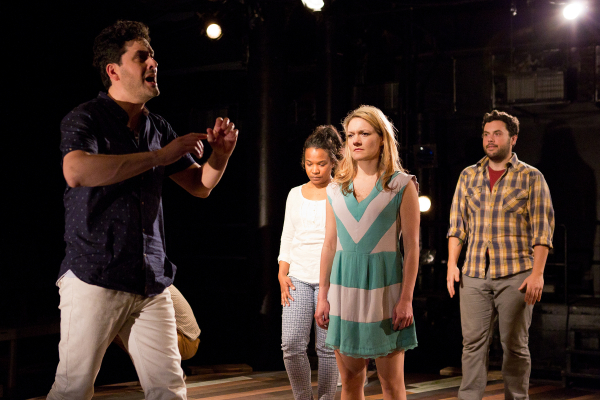Family Play (1979 to Present)

(© Hunter Canning)
In February, a play called Love and Information opened at the Minetta Lane Theatre. Made up of almost 60 vignettes related to one another only by theme, the show proved to be a snappy, visually exciting commentary on modern information-sharing and short attention spans. Now, at The New Ohio Theatre, CollaborationTown has produced a similarly constructed piece, Family Play (1979 to Present). This play, however, plods along for 90 very long minutes before finally delivering a few payoffs in its final 15.
Family Play (1979 to Present) has no discernible plot, main characters, setting, or time period — despite its title — other than the recent past. The play comprises dozens of short scenes, each reenacting a particular episode in the life of two or more people — friends, siblings, married couples, families, and so on.
The episodes are grouped into acts (each of which ends, strangely, with a song sung by the six actors) that roughly correspond to the stages of life from childhood to middle age. We see two girls playing "show-and-tell" ("Yours is super pretty"), a son arguing with his mother about getting his tongue pierced, a teenager telling a girl he got turned on by an e.e. cummings poem, a mother feeling unappreciated by her husband and daughter, a straight couple going on an awkward first date, a lesbian couple getting engaged, a brother driving his sister to rehab, and more.
Unfortunately, few of these scenarios offer anything fresh. Instead, they seem like a collection of free-writing exercises from the memories or imaginations of their authors, Geoffrey Decas O'Donnell, Boo Killebrew, and Jordan Seavey. And at an hour and 45 minutes, this series of strung-together episodes feels like you are spending a lifetime with these characters, until the last 15 minutes or so, when the theme shifts to birth and dying.
Here the play briefly offers some genuinely interesting, witty, insightful writing. In one scene, two gay men ask a friend to be a surrogate mother, and the scene ends with a joke at the expense of one of the men. In another, a bartender describes how he cried at work while thinking about a dead friend — and how he got major tips from his customers as a result. In another, a married gay man pays a poignant visit to his mother, who suffers from dementia in a nursing home.
Scenes like these, however, are all too rare. The production does, however, showcase some fine young acting talent. Mark Junek and Therese Plaehn join writers Killebrew and O'Donnell on the simple, circular, wooden stage (designed by O'Donnell) and give great performances. Eboni Booth and Jorge Cordova stand out for some nuanced portrayals of their characters. Watching them work lends interest to some of the less engaging vignettes, and director Lee Sunday Evans keeps the cast members moving on stage, sometimes dizzyingly around it, as they slip fluidly from one scene to another.
Family Play tries to position all of its tiny memories in the context of the vast, inscrutable universe, as the characters' occasional star-gazing meditations and O'Donnell's brief history of existence at the end make clear. That's an ambitious goal for any play, and such lofty philosophizing presses the ponderous weight of this experimental piece even harder upon the chest. Personal memories may be interesting to those who have them, but they are not necessarily interesting to others. Family Play, sadly, contains more of the banal than the new.











